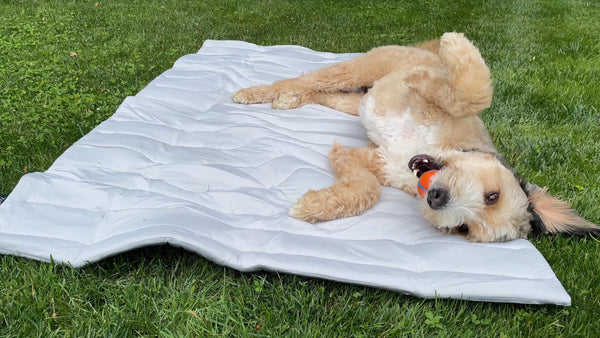Have you ever watched a puppy sleep and noticed how rapidly their little chests rise and fall? It's a sight that can be both adorable and puzzling. As a new pet owner, you might wonder, "Why do puppies breathe so fast when they sleep?"
This behavior can sometimes cause concern, especially if you're unfamiliar with what is normal for a sleeping puppy.
In this article, we will explore the reasons behind this rapid breathing, offer reassurance, and suggest solutions like accessories, mattresses, and pillows to help ensure your puppy sleeps soundly.
Finding Out Why Do Puppies Breathe So Fast When They Sleep?
To understand "why do puppies breathe so fast when they sleep," it's essential to consider several factors contributing to this behavior.
Like human infants, puppies have different physiological needs and responses than adults. Here are some critical reasons for their fast breathing:
Developmental Growth
Puppies are in a critical stage of development, both physically and mentally. Their bodies are increasing, and their brains are processing significant new information.
This high activity level during their waking hours translates into a need for more oxygen, even while they sleep, which can cause them to breathe faster.
REM Sleep Cycle
One of the main reasons puppies breathe quickly during sleep is due to their sleep cycles. Puppies spend much time in REM (Rapid Eye Movement) sleep, a phase where dreams occur and the brain is highly active.
During REM sleep, it's normal for breathing to become irregular and faster. This is a natural part of their development and is usually nothing to worry about.
Temperature Regulation
Puppies have a more challenging time regulating their body temperature than adult dogs. They might breathe faster to cool down, especially if they feel warm. Ensuring their sleeping area is cool and comfortable can help them maintain a steady breathing pattern.
Smaller Respiratory System
Puppies have smaller respiratory systems compared to adult dogs. This means they must breathe faster to get the same amount of oxygen. As they grow and their lungs develop, their breathing rate will gradually slow down to a more typical pace.
High Metabolism
Puppies have a higher metabolism than adult dogs, which means they burn energy faster and need more oxygen to support their rapid growth and development. This increased demand for oxygen can result in faster breathing, especially during sleep when their bodies are working to recover and grow.
Common Concerns and When to Seek Help
While fast breathing in sleeping puppies is generally expected, there are instances where it might indicate an underlying issue. Knowing the difference between normal and abnormal breathing can help you decide when to seek veterinary advice.
Normal vs. Abnormal Breathing
Normal rapid breathing during sleep will typically be accompanied by other signs of healthy sleep, such as twitching paws, gentle whimpers, or relaxed postures.
However, if your puppy's fast breathing is accompanied by other symptoms like coughing, wheezing, or labored breathing, it might indicate a respiratory issue or illness.
Conditions to Watch For
- Respiratory Infections: Puppies are susceptible to respiratory infections, which can cause symptoms like coughing, nasal discharge, and difficulty breathing.
- Heart Problems: Congenital heart defects can also lead to abnormal breathing patterns. A vet checkup is essential if your puppy tires quickly or shows signs of weakness.
- Allergies: Environmental allergens can affect your puppy's breathing. Watch for any changes in their environment that might trigger allergic reactions.
Solutions for Better Sleep
To help your puppy sleep better and breathe more comfortably, consider the following solutions:
Comfortable Bedding
Both heated and cooling pet mats can help puppies get better sleep by providing a comfortable and regulated sleeping environment.
Heated Pet Mat
Benefits:
Warmth: Puppies, especially those that are very young or have thin fur, can have difficulty regulating their body temperature. A heated mat provides consistent warmth, which is particularly beneficial in colder climates or during the winter months.
Comfort: The warmth from a heated mat can soothe muscles and joints, helping puppies relax and fall asleep more easily.
Security: Warmth can mimic the presence of their mother or littermates, providing a sense of security and reducing anxiety.
Uses:
Ideal for newborn puppies or those recovering from illness or surgery.
Can be used in colder environments to ensure the puppy remains warm and comfortable.
Benefits:
Temperature Regulation: In hot weather, a cooling mat can help prevent overheating and keep the puppy comfortable. Puppies can be prone to heat stress, and a cooling mat can provide a safe way to regulate their body temperature.
Relief from Heat: Puppies that overheat may become restless and have trouble sleeping. A cooling mat can help them cool down and settle into a restful sleep.
Comfort: Similar to heated mats, cooling mats can help soothe and comfort puppies, particularly those with thick fur or prone to overheating.
Uses:
Ideal for warm climates or during the summer months.
Useful for active puppies that may become overheated from play.
Choosing the right mat depends on the current climate, the puppy's specific needs, and their ability to regulate body temperature. Using these mats appropriately can ensure puppies stay comfortable, relaxed, and well-rested
Proper Ventilation
Ensure your puppy's sleeping area is well-ventilated. Fresh air circulation can help maintain an optimal temperature and prevent overheating. Avoid placing your puppy's bed in direct sunlight or near heat sources.
Creating a Calming Environment
A peaceful sleeping environment can significantly impact your puppy's breathing and overall sleep quality. Here are some tips to create a calming space:
Puppies are sensitive to noise; a quiet environment can help them sleep more soundly. Consider using white noise machines or soft music to mask any disruptive sounds.
Soft, cozy bedding can provide comfort and security, helping your puppy feel safe and relaxed. Choose bedding that is easy to clean and free from harsh chemicals that could irritate your puppy's skin or respiratory system.
Monitoring and Maintaining Healthy Sleep
Regularly monitoring your puppy's sleep patterns can help you identify any changes that might indicate a problem. Keeping a sleep journal can help track their breathing and overall health.
Regular Checkups
Routine veterinary checkups ensure your puppy is healthy and developing normally. Your vet can guide you on what to expect and when to be concerned about rapid breathing during sleep.
Balanced Diet
A balanced diet can support your puppy's overall health and respiratory system. Ensure your puppy is getting the proper nutrients to support its growth and development.
Choosing the Right Sleeping Spot
Selecting the right sleeping spot for your puppy can contribute to better sleep and more regular breathing. Here are some factors to consider:
Choose a quiet, low-traffic area of your home for your puppy's bed. This will help minimize disturbances and create a peaceful environment for sleep.
Investing in a high-quality dog bed that offers good support and comfort can make a significant difference. Look for beds with memory foam or orthopedic features, especially for larger breeds or puppies with joint issues.
Addressing Common Sleep Issues
Sometimes, puppies might have trouble sleeping due to various issues. Addressing these problems can help improve their sleep quality and breathing. Here are some common sleep issues and solutions:
Nighttime Whining
Puppies might whine at night due to loneliness or discomfort. Providing a soft, comforting toy or placing a ticking clock near their bed can mimic the sound of a heartbeat and help soothe them.
Frequent Waking
If your puppy wakes up frequently at night, it might be because it needs to go to the bathroom. Establish a consistent bathroom routine before bedtime to reduce nighttime disruptions.
Overstimulation
Overstimulation before bedtime can make it difficult for your puppy to settle down. Avoid high-energy play right before bed and focus on calming activities instead.
Environmental Factors Affecting Puppy Breathing
Understanding the environment's role in your puppy's breathing patterns is essential. External factors, including air quality, temperature, and humidity levels, can influence how a puppy breathes during sleep.
Here are some considerations to help optimize your puppy's sleeping environment:
Air Quality
Good air quality is vital for your puppy's respiratory health. Dust, allergens, and pollutants in the air can irritate their respiratory system, leading to faster breathing. Regularly cleaning your home and using air purifiers can help maintain a clean and healthy environment for your puppy.
Temperature Control
Maintaining a consistent and comfortable temperature in your home is crucial for your puppy's comfort. Puppies are sensitive to temperature fluctuations, which can cause them to breathe faster as their bodies attempt to regulate their internal temperature.
Investing in a good thermostat and keeping the room at a moderate temperature can make a big difference.
Humidity Levels
Humidity levels can also impact your puppy's breathing. Extremely dry or overly humid environments can cause respiratory discomfort.
Using a humidifier in dry climates or a dehumidifier in humid areas can help maintain optimal humidity levels, contributing to more relaxed breathing during sleep.
Conclusion
Understanding "why do puppies breathe so fast when they sleep" can ease many concerns for new pet owners. While rapid breathing is often a regular part of a puppy's development and REM sleep cycle, it's essential to be aware of the signs that indicate a potential problem.
By providing a comfortable, well-ventilated sleeping environment and ensuring regular veterinary checkups, you can help your puppy sleep soundly and breathe comfortably.
With the proper care and attention, your furry friend will grow up healthy and happy, ready to explore the world with you by their side.



1 comment
Dr. Matthew Eberly, Foot & Ankle Specialist has the credentials and expertise to treat all your foot and ankle concerns. Dr. Eberly is a skilled, board-certified podiatrist and podiatric surgeon with extensive clinical and surgical experience. Dr. Eberly enjoys treating patients of all ages with issues such as foot and ankle pain, ingrown toenails, bunions, flat feet, toenail fungus, sports injuries, fractures, achilles tendonitis, and plantar fasciitis. Dr. Eberly likes to work with each patient to develop a unique plan that will address all his or her concerns to their satisfaction.
podiatrist victoria tx